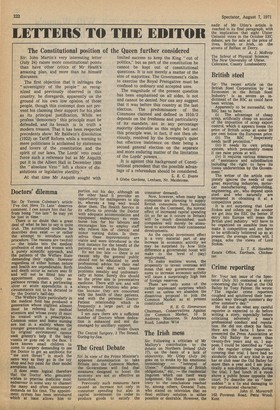The Constitutional position of the Queen further considered
limited success to keep the King " out of politics," but as part of the constitution he cannot be kept out of constitutional questions. It is not merely a matter of the size of majorities. The Government's claim to exercise the Royal Prerogative must be confined to ordinary and accepted uses.
The magnitude of the present question has been emphasised on all sides, is not and cannot be denied. Nor can any suggest that it was before this country at the last election. The predominance of the Commons claimed and defined in 1910/2 depends on the freshness and particularity of its mandate, not in any percentage majority (desirable as this might be) and this principle was, in fact, if not then obviously, resolved by the Sovereign's quiet but effective insistence on their being a second general election on the separate and more enduring matter of the limitation of the Lords' powers.
It is against this background of Constitutional precedent that the _possible advantage of a referendum should be considered. L. E. C. Evans 8 Glebe Gardens, Lenham, Nr, Maidstone. Sir: John Martin's very interesting letter (July 24) raises more constitutional points than have other critics of Mr Heath's amazing plan, and more than he himself discusses.
The first objection that it infringes the "sovereignty of the people" as recognized and previously observed in this country, he disregards, apparently on the ground of his own low opinion of those people, though this contempt does not prevent his claiming their support for his plan as its principal justification. While we profess 'democracy' this principle must be defended, and its breach is in truth a modern treason. That it has been respected precedents show: Mr Baldwin's dissolution (1922) on Tariff Reform while a warning to mere politicians is acclaimed by statesmen and lovers of the constitution and the spirit of our laws. The Lords' veto could force such a reference but as Mr Asquith put it in the Albert Hall in December 1909 the "absolute Veto " left a choice of dissolutions or legislative sterility."
At that time Mr Asquith sought with


































 Previous page
Previous page